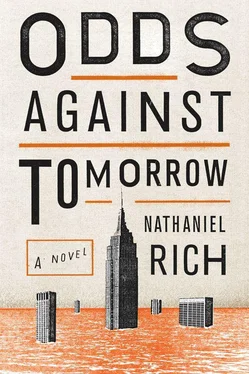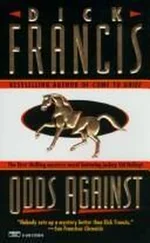“I don’t get it. Would you rather stay here ?”
“No! Of course not.”
Jane turned abruptly, advancing toward the woman with the clipboard. Her name tag read LANORE.
“Lanore? Excuse me, but when do the buses start leaving for Manhattan?”
“I’m sorry,” said Lanore. “I don’t have that information.”
“But you work for FEMA, don’t you? You must know something. We need to get back.”
“I know. We all want to go home.”
“Jane,” said Mitchell, touching her shoulder. “It’s OK.”
“No, it’s not.” Jane shook him off with a violent twitch. Her eyes were blazing. He’d never seen her like this. “She has a job to do.”
“Yeah!” said a man standing behind Mitchell. “We want answers!”
“Hey lady, what about Gowanus?”
“Lady, why is the water getting higher in Dyker Heights?”
“She making up shit.”
Lanore looked around anxiously, as if for backup. But no other staff was near. Just a crowd of angry, scared people.
“I don’t know anything,” said Lanore to Jane. “I just don’t.”
“Do you even work for FEMA?”
Lanore shook her head, her lips trembling.
“I’m a receptionist for the Brooklyn Transit Police,” she said, unable to stifle a sob. “District Thirty-nine. I don’t know nothing. My family — I haven’t heard from them since this whole mess started. I don’t know where they are.”
“I’m sorry,” said Jane. “That’s horrible.”
“She’s crying. Look at that.”
“At least she got a fancy trailer.”
“At least she got family.”
Lanore, her cheeks damp, focused on Mitchell. The sight of him seemed to embolden her.
“But you — you’re the so-called Prophet. And you’re telling me that you don’t know what’s happening?”
The crowd turned to Mitchell. The crowd turned — and Jane turned too.
Mitchell put up his hands.
“I’m just a financial consultant,” he said.
“He doesn’t know anything,” said Jane a bit too firmly, but it was too late. No one would listen to her. At the trailer the previous evening, when he had made his apologies, Marcy Rosado and her friends had appeared unconvinced, but they had left him alone. It helped that they had recognized his name from the news. At lunch, two of the McIntyre kids had even asked him to autograph their napkins. But now the mood was different. Nobody here wanted his ink. They wanted his blood.
A circle closed around him. The shouting faces moved in, their breath hot on his neck, on his brow.
“Jane!” said Mitchell. “Jane!”
Jane was yelling somewhere, but very quietly. The other voices were louder and angrier.
“What are you keeping from us?” said an old man in a cloth cap and grimy overcoat, very close to Mitchell’s ear.
“I’ve heard about you,” said a woman with a crumpled, washed-out face, on the other side of him. She smelled of detergent. He thought she might have been one of the McIntyres.
“Tell us what you know.” This was a skinny white man with five-day stubble and a ghastly Oklahoma-shaped scab across his nose. He shook with rage, spittle forming on his lip. His fists clenched. “Tell us, kid!”
The man reached out and nudged Mitchell’s shoulder. “Tell us!”
Mitchell raised his arms in front of his face. He was trapped within a tiny chamber of noise and saliva.
And then a very strong and very large hand came down on his head.
7.
They met after midnight at the northern tip of the island, beneath the railroad overpass.
It was too dark to see faces. That was the point. If the expedition failed, they didn’t want to get arrested. Already there were rumors that the jails were swelling, that a person who stole bottled water would be tossed into the same cell as the murderers. In case they needed a further reminder, the yellow blinking lights of Rikers Island were visible across the river, the searchlights cutting scythes in the black water.
It was too dark to see faces, but Mitchell could tell that there were eight people in all, only three of whom he could identify: himself, Jane, and Hank Cho. It wasn’t difficult to pick out Hank. He was six three, about 230 pounds, with a powerful torso and a broad, flat head like a tombstone. His arms, too, were brawny, but short, as if the bulk he had added to his arm muscles caused them to contract. The general resemblance was to one of those carnivorous bipedal dinosaurs. Mitchell had felt the power in Hank Cho’s fingers that afternoon, when Hank placed his palm over Mitchell’s head.
“Leave the boy,” Hank had said. “He don’t know shit.”
The fingers exerted a remarkable pressure on Mitchell’s skull.
“And they call him prophet,” yelled one of the McIntyre men.
Hank gave McIntyre a defiant glare. McIntyre shrugged, and turned his back. The crowd dissipated, the refugees wandering to their trailers. Once the danger had passed, Hank lifted his hand.
“Thank you,” said Mitchell. “They wanted to kill me.”
“I have a proposition for you,” said Hank. He gestured at Jane. “And your friend.”
And so they ended up at the midnight meeting beneath the railroad overpass.
The plan was simple. They were going to get off FEMA island. Where they ended up would be their own business, but for safety they would escape in a single group. They’d leave in the middle of the night. The plan was simple, but the execution posed problems.
“They patrol the roads,” said one man. “You trying to swim?”
“They patrol the three highway bridges. But not the Hell Gate. That’s only for freight trains. It spans the Bronx Kill.”
“What?”
“The water between here and Queens.” Hank pointed in the direction of the RFK Bridge. “ That . The Hell Gate is the little bridge, without the lights. In front of the big one.”
The RFK was lit brightly now, electricity having been restored, but the old railroad bridge stood in complete darkness. In the moonlight all you could see were the triangle cutouts of the steel trusses and the squat towers on either shore. Mitchell had never seen the bridge before, but he remembered it from disaster assessments of New York. The Army Corps of Engineers concluded that the Hell Gate would be the last bridge standing in New York after a nuclear explosion. Left to nature, it would outlast every other bridge in the city by a millennium.
“Hell Gate over Bronx Kill?” someone said. “I don’t like the sound of that.”
“Looks dangerous.”
“We have to walk on train tracks?”
“This is ludicrous.” That was Jane.
Inwardly Mitchell cursed Alec Charnoble. In some way, he was convinced, this was all Charnoble’s fault.
“The Hell Gate will take us into Astoria,” said Hank. “It’s a freight track, but there are no trains running now. We stay on the track past the bridge. It goes over Woodside, then bends south to Middle Village, Ridgewood, all the way to Broadway Junction.”
“How do you know all that?”
“I work for the MTA.”
“Yeah, right. Doing what?”
“Track maintenance foreman.”
“I don’t live but ten blocks from Broadway Junction,” said someone.
“I’m two stops east.”
“From Broadway Junction,” said Hank, “you can go wherever you like. I’m planning on heading south.”
“You from down there?”
“Nope. Flushing. But I’ve been hearing that Flatlands and below got clean swept away.”
“Why you going, then?”
“I’m looking to start again.”
No one had anything to say about that.
“What are the Flatlands?” This was Mitchell.
“It’s just about the end of the earth,” someone said. “Or as close as you can get without leaving New York City.”
Читать дальше












